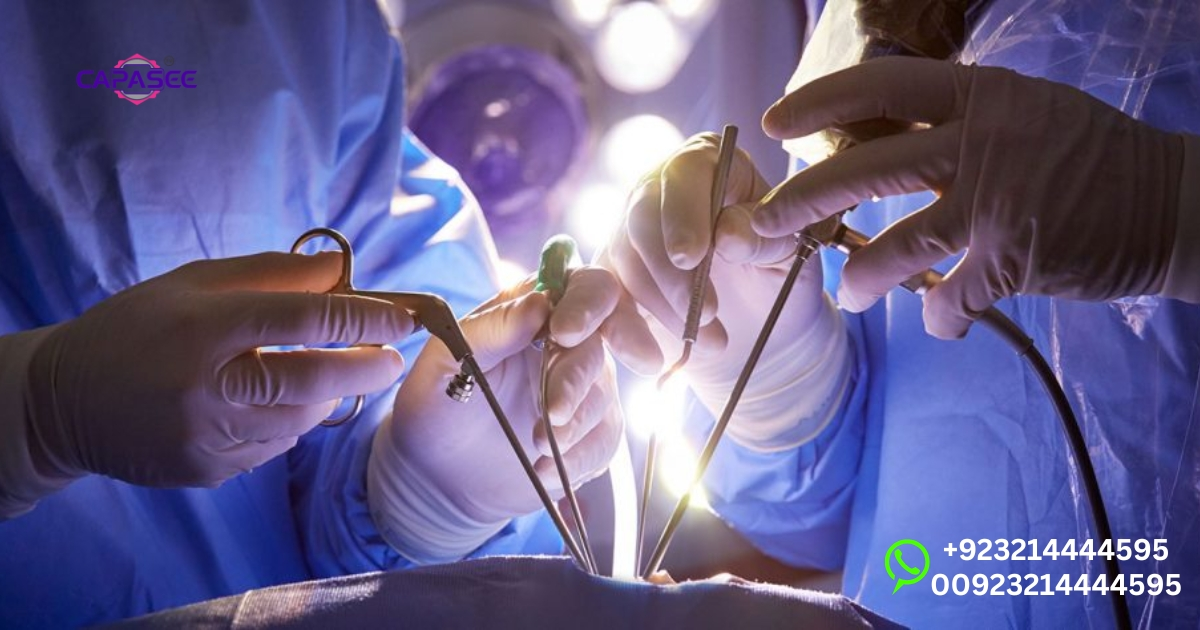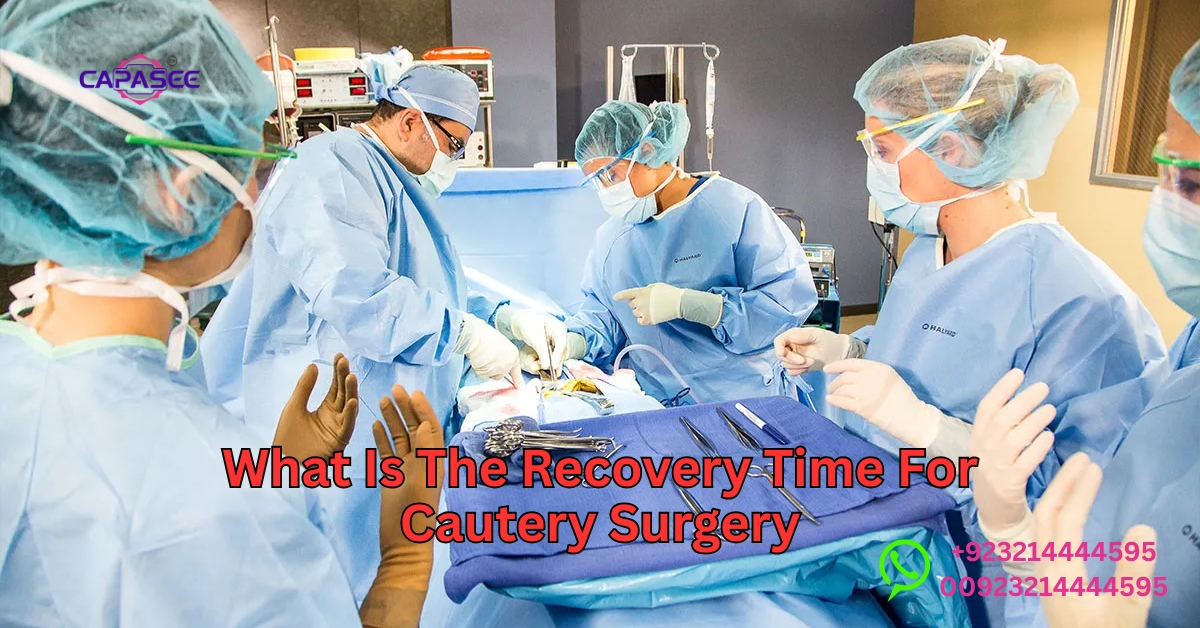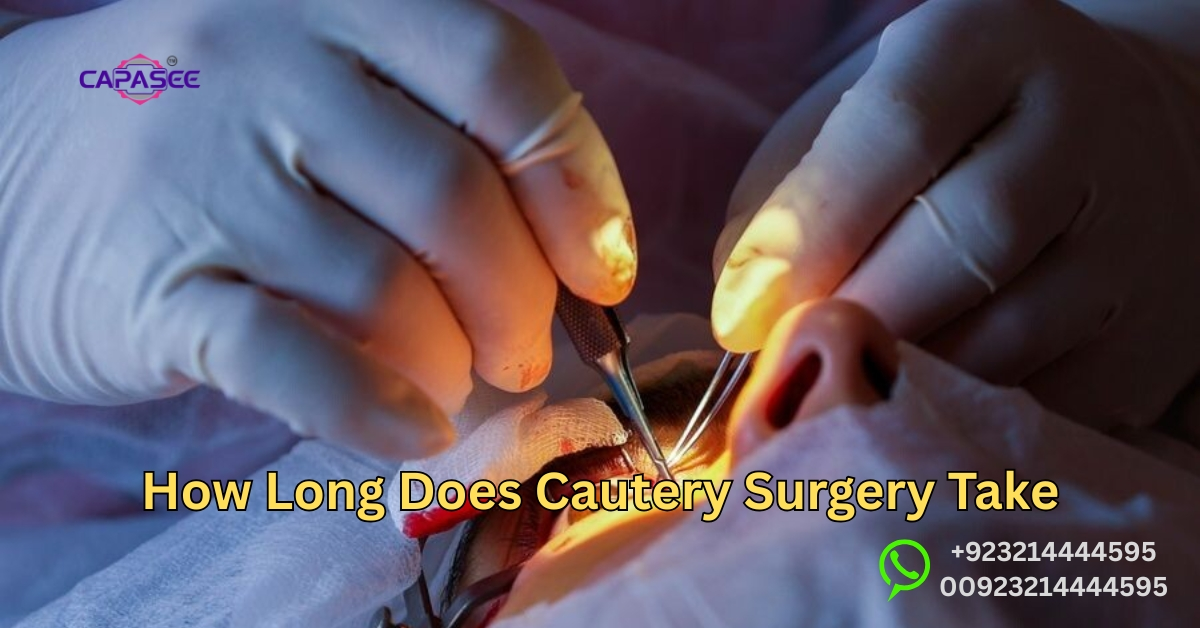Have you had a cautery operation and are wondering if it will be some time before you feel like yourself? Waiting until you are back to your normal routine is sometimes difficult. The fact that the recovery time is not certain may put strain on an already daunting scenario and make you anxious and even a bit curious about what is about to happen.
In this blog post, we will deconstruct the recovery of the cautery surgery in a simplified way. You will have a clear idea of what influences your recovery period, as well as some useful advice on how to recover faster. Towards the end, you will be in a position to know exactly what to expect and how to go about your recovery in a confident manner. You can find the answers that you are seeking by continuing to read.
What is The Recovery Time For Cautery Surgery at Capasee Electro Medical Engineering
Cautery surgery is a practice of medicine that involves heat to ablate or cure tissue. At Capasee Electro Medical Engineering, we make sure that it is carried out securely and successfully. The time taken to recover may differ, based on the part of the body that has been treated and the general health of the patient.
The recovery time of cautery surgery is vital in the delivery of the best outcomes. Post surgical healing process normally entails follow up care, wound care and patience. The expectation can help reduce stress and allow the patients to cope with the recovery process.
Typical Recovery Timeline for Cautery Surgery: What Patients Should Know
The average length of recovery is between a few days and a few weeks following cautery surgery. The majority of patients have slight discomfort and swelling at first. The healing period of the tissues depends on the place of treatment and the adherence of the patient to the recovery instructions.
The first week is critical to people going through electrosurgery recovery. You might actually observe scabbing or mild bruising and it is within the norm. You need to maintain the area clean and dry according to all the post surgical healing guidelines recommended by your healthcare specialists.
You May Also Read This Blog: Does Cautery Stop Bleeding
Factors Influencing Cautery Surgery Healing Time and Duration
The recovery time of cautery surgery is influenced by a number of factors, among them the complexity of the procedure and the health of the patient. Slow down scar healing, cautery surgery can be done by age, medical history, and lifestyle habits like smoking. To ensure the best results, healthy eating and sleep are necessary.
Cautery wound care is important in the healing process. Through adequate medical cauterization, patients are able to keep complications at a minimum and decrease time taken to heal the cautery procedure. Maintaining the treated zone is a way of infection prevention and helps to recover in the shortest time.
How Long Does Cautery Surgery Take to Recover? Realistic Expectations
Recovery time of cautery surgery may take different periods, although the majority of those affected resume normal life within two weeks. The period of complete recovery can be weeks long, depending on the area of treatment and personal health. Side effects of cautery surgery like swelling or slight discomfort are important to find out.
More invasive operations may take longer to heal following cauterization. Their most important thing during this time is patience. Adhering to the tips on recovery in cautery surgery, as well as instructions on the patient aftercare, will allow to accelerate the recovery and guarantee the optimal result.
| Factor | Impact on Recovery Time |
| Area of Surgery | Larger areas take longer to heal |
| Health and Age | Younger, healthier patients recover faster |
| Post Surgical Care | Proper care can reduce healing time |
| Smoking or Alcohol Use | Slows down recovery and healing |
You can make the healing process easier by adhering to the instructions and being conscious of the process to recover after the cautery surgery.
Comprehensive Post Cautery Surgery Care and Healing Process

After cautery surgery care is a very important procedure that should be observed after undergoing a cautery procedure. The time of healing following the cauterization process may vary, but when properly cared for, the recovery time can be reduced to a bare minimum. Take all recovery directions to achieve the best results.
The most important thing is careful attention to the recovery process of cauterization treatment. The recovery period of the cautery surgery requires patience and rest. Adherence to post surgical tips will result in a faster healing wound that has fewer complications, enabling you to resume normal activities early.
Essential Recovery Tips After Cautery Treatment by Capasee Experts
Capasee specialists suggest some necessary recovery guidelines for cautery surgery. These involve the prevention of any heavy physical exercise and keeping the treated part clean and dry. This will contribute to minimizing the possible risk of infection and will make the healing period as short as possible.
Another factor in the cautery surgery recovery that should not be ignored is the adherence to After cautery wound care recommendations. These are to aid the management of swelling, prevent infection and speed up the healing process of the cautery procedure. This will be facilitated by rest and good hygiene in the body’s natural healing.
Cautery Procedure Recovery Stages Explained
The healing process of cautery has a number of stages. First, it can cause swelling and discomfort, this will disappear after several days. With cleanliness and protection in the area, healing will occur much more quickly and effectively after the cauterization.
The treated tissue will start to heal over time. The scar healing cautery surgery process may also result in scabs that should not be disturbed. The process of healing takes time, and as time goes by, you can gradually resume normal activity, depending on the wellness of the part which was damaged.
Managing Cautery Surgery Pain Duration and Comfort Measures
Pain management in the downtime of the surgery under the use of cautery is essential in a comfortable recovery. Some levels of discomfort can be felt during the initial days, which can be dealt with through use of over the counter analgesics and ice packs. The recovery instructions should always be followed to reduce pain and swelling.
The pain ought to reduce as the time of healing the tissue advances. One should also stick to the advice of patient aftercare to help the patient get well. When caring properly for the treated area, you will have a chance to cope with the discomfort and get back to your daily routine soon.
Identifying and Overcoming Cautery Surgery Complications for Faster Healing

Cautery surgery is an effective procedure with high success results, however, complications may occur during the healing period following cauterization. This could be infection, hematoma or slow recovery. By identifying these problems early on, you can prevent them and shorten the time it takes to recover after the cautery surgery.
Not to complicate the situation, adhere to all the instructions of the post cautery wound care. This involves maintaining the treated area, avoiding unnecessarily moving around and adhering to what your doctor tells you to do about pain. This way, you contribute to the healing process of the cautery procedure and reduce the chances of prolonged downtime during cautery surgery.
Common Cautery Surgery Complications and Recovery Insights from Capasee
Swelling, reddening, or slight discomfort of the treated area are some typical side effects of cautery surgery. These normally disappear in several days. The rescue measures of cautery surgery by Capasee experts include good hygiene, rest, and taking prescribed drugs.
These insights will assist you in controlling the healing time and avoid unnecessary complications. In case of any persistent pain or any evidence of infection, call your healthcare provider and have him/her come so that the related intervention is done on time and the additional counseling is provided on post operative recovery.
Read More: Our Products
How to Support Cautery Wound Healing Process Effectively
The cautery procedure healing process may be shortened by administering appropriate patient aftercare. This involves that the wound is regularly cleaned, prescribed ointments applied and scabs should not be scratched or picked. This will underpin scar healing cautery surgery and avoid infections.
Proper diet and adequate water intake also contributes to the rapidity of the tissue repair. Maintaining a good hydration level and consuming food that contributes to wound healing including high protein meals can help to recover faster and reduce the risk of complications.
Minimizing Cautery Surgery Downtime: What to Expect After Treatment
Recovery time of cautery surgery may be different depending on part of treatment though most patients can resume their regular activities within a few days and weeks. Following recovery instructions is important during the recovery period so as not to strain the healing tissue hence a smooth recovery.
In such a case, you will be expected not to engage in any vigorous activity in the few days after the procedure to avoid disrupting the wound. As soon as the first swelling and pain have passed, you can slowly resume your normal routine. But with the recommended cautery surgery recovery tips in place, this will be easier.
FAQ’s
How long does cautery take to heal?
Cautery surgery recovery is normally a few days to a few weeks, depending on the location of the treatment.
What are the side effects of cautery surgery?
Such side effects as mild swelling, redness, and discomfort can be observed and normally disappear in several days.
What not to do after cautery?
Avoid scratching or picking the treated area, and not to engage in intense activity which may disrupt the healing process.
Does cautery leave scars?
Cautery surgery can be accompanied by a scar, although it can be healed with scarring when well attended.
What is the fastest way to heal a cauterized wound?
Wound care including after the application of the cauterization helps heal faster and keeping the wound clean, hydration.
Conclusion
Recovery time of cautery surgery depends on a number of factors, such as the area that has been treated and your health in general. Although the majority of patients find themselves cured in a couple of weeks, correct cessation of the wound after cauterization and adherence to the recovery plan play an important role in the effective recovery process. The decreased downtime of cautery surgery, combined with ensuring faster healing is possible through pain management, complications prevention, and aftercare of the treated area. You should never use advice that is generic, and to the best of your ability, it must be personalized by consulting your healthcare provider.




